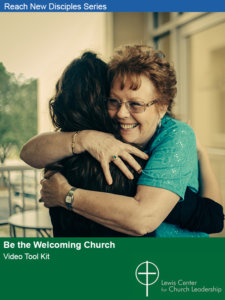Lewis Center Director Doug Powe writes that a focus on relationships helps a church connect with its neighbors in genuine and effective ways. Successful outreach efforts truly engage others by listening, extending invitations, and building community connections.
What’s the secret to success in effective church outreach? The question assumes that outreach is like homemade BBQ sauce. If I just add my special secret ingredient, I’ll make the best sauce in town. And anyone who uses my secret ingredient can also make the best sauce in town. Connecting with your neighbors effectively is not like making BBQ sauce. But if there is a secret ingredient it is the power of relationships.
In the Gospels, Jesus devoted most of his time to building relationships with the disciples and so many others. He journeyed with them. He ate with them, taught them, and healed them. The disciples and others felt genuinely connected to Jesus. They knew Jesus and Jesus knew each of them. Consider the example a Jesus’ encounter with the Samaritan woman at the well. (John 4:1-30)
Jesus striking up a conversation with this woman does not seem extraordinary to many of us today. Yet, if we are honest with ourselves, we do not attempt to share our beliefs and build relationships with those we do not know or with most people we do know! In this text Jesus disregards societal norms for the sake of a genuine relational encounter.
Keeping the focus on relationships also prevents us from focusing on the wrong things. Our desire to connect with new people should not be motivated by a desire to expand church membership, replace giving units, or score more points in a game of saving souls. The goal of any type of evangelism is relationships and helping others to build a relationship with Jesus.
Four questions can help you keep your focus on relationships as you consider new ways of connecting with your neighbors:
1. Are we truly open to engaging others?
This sounds like a silly question, but the reality is most of us are not. In fact, we try to avoid eye contact with others for fear of them talking to us. How many of us sit in our seat on a bus or airplane and immediately get out a book or start doing something on our phone so that the person next to us will not want to have a conversation. Guilty!
In the story of Jesus’ encounter with the woman at the well, he chose to walk through a territory that most Jewish people avoided. Jesus is open to having a conversation with a woman who is at the well alone. He did not avoid engaging the woman, even though it would have been the socially acceptable thing to do. Rather, he was the one who initiated the conversation. Let me be clear, I am not suggesting we create phony conversations with others. Some of my best conversations with strangers on airplanes have been when they simply asked me, “How was your day?” And that question led to a two-hour-long conversation. These individuals were open to starting a dialogue.
Building relationships requires being open to engaging others. This may mean breaking our normal routines and traveling an unaccustomed route, as Jesus did, in order to see new faces. This may mean being willing to ask others about their day and then genuinely caring about the response. Being relational starts with us being open to the Spirit and to others.
2. Are we willing to listen to others?
Communication is always a two-way street. Often, we engage others simply to tell them what we believe or think. Others can see through us when we are not genuinely interested in hearing their story. The story of Jesus and the woman at the well exemplifies the importance of listening. Based on cultural conventions Jesus could have ignored her because of her ethnicity and gender. Instead, he treated her like an equal and listened to her opinions. Although she had never met Jesus, she felt like he wanted to know her as an individual and did not objectify her.
Anytime we encounter another individual, it’s important to hear their story. It can’t be just sharing what we want to say. One of the reasons many of us do not like evangelism is because the focus is on talking and not listening. But many of the best evangelists I have encountered were good listeners who said very little. Like Jesus, they heard others and made them feel special.
Being a good listener requires time. In a culture where we are constantly in motion and cramming as much as we can into each day, taking the time to listen to others may seems like a waste of time. But relationships are built when we are willing to listen and truly hear the stories of others.
3. Are we extending an invitation?
Jesus invited the Samaritan woman to experience living water. And, if you know the rest of the story, she extended an invitation to those in her town. “Come see a man who knew all about me.” Like Jesus and the Samaritan woman, we are called to extend invitations to others. I am sure the reason most of us do not extend invitations is we are afraid that the answer will be “No.” And truthfully no one likes rejection. But it is also true that many people today, like the woman at the well, are longing to be seen, heard, and invited into transforming relationships. Across the Gospels, Jesus was always inviting individuals to something. In almost every encounter Jesus extended an invitation that could be accepted or rejected. In most instances it was accepted because he has been open and has listened.
4. Do our ways of connecting with individuals also build community connections?
Jesus connected with the woman at the well and then connected her back into community. It is not an either/or choice, but always a both/and. The woman at the well had to move out of her comfort zone to talk to a Jewish man. We need to move out of our comfort zones by talking to people who are younger, older, people who dress differently, and so on. Making new connections means we are constantly expanding the circle in the community to make space for others. It is not enough to just build one-on-one relationships. We have to also create spaces in the community for others to feel like they belong.
There is power in connecting with our neighbors in relational ways because it opens us to the Spirit and creates the possibility of our being transformed by those with whom we connect. This power depends on our listening deeply with the intention to really hearing what someone else is sharing. It depends on our willingness to risk rejection for the sake of inviting someone to experience transformation and make connections with other individuals and with a broader community. The power of relationships is about discipleship modeled after Jesus.
 Related Resources
Related Resources
- Be The Welcoming Church Video Tool Kit
- 4 Characteristics of Biblical Evangelism by Doug Powe
- Friendship as a Means of Discipleship by Greg Moore






